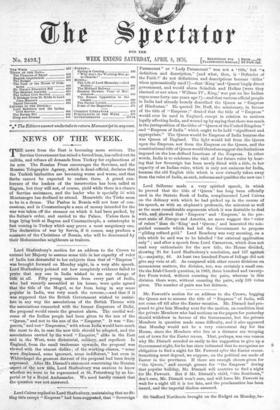Lord Shaftesbury's motion for an address to the Crown to
entreat her Majesty to assume some title in her capacity of ruler of India less distasteful to her subjects than that of " Empress " was brought forward on Monday night, in a very able speech. Lord Shaftesbury pointed out how completely evidence failed to proVe that any one in India wished to see any change of title at all. Fifty young natives from every part of India, who had recently assembled at his house, were quite agreed that the title of the Mogul, so far from being in any sense popular in India, was very much the reverse,—and that if it was supposed that the British Government wished to assimi- late in any way the associations of the British Throne with the associations connected with the former Emperors of Delhi, the proposal would create the greatest alarm. The cordial wel- come of the Indian people had been given to the son of the " Queen," and not to the son of the "Emperor." It was "Em- perors," and not" Empresses," with whom India would have much the most to do, in case the new title should be adopted, and the associations carried by the word "Emperor," alike in the East and in the West, were dictatorial, military, and repellent. In England, from the small tradesman upwards, the proposal was viewed with the utmost dislike ; of the working-classes, "some were displeased, some ignorant, some indifferent," but even in Whitechapel the greatest distrust of the proposal had been freely expressed. After Mr. Disraeli's statement concerning the Russian -aspect of the new title, Lord Shaftesbury was anxious to know whether we were to be represented at St. Petersburg by an Im- perial or by a Royal Ambassador. We need hardly remark that the question was not answered.


































